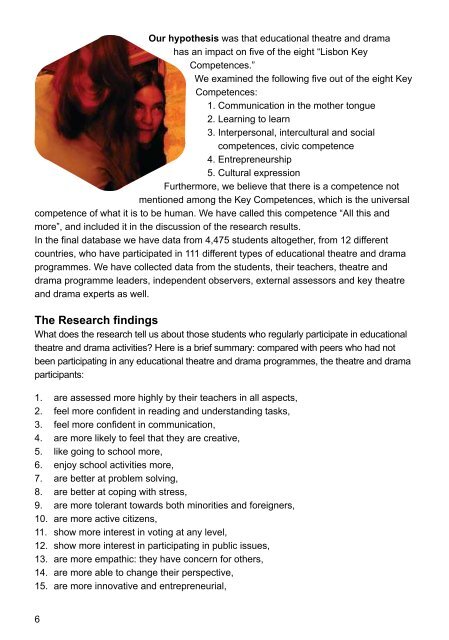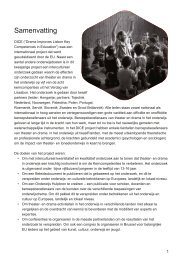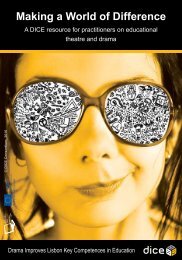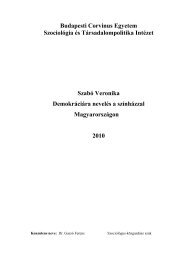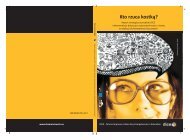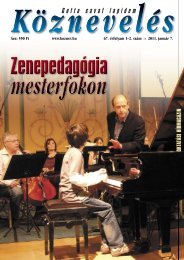Policy Paper - Drama Improves Lisbon Key Competences in Education
Policy Paper - Drama Improves Lisbon Key Competences in Education
Policy Paper - Drama Improves Lisbon Key Competences in Education
You also want an ePaper? Increase the reach of your titles
YUMPU automatically turns print PDFs into web optimized ePapers that Google loves.
Our hypothesis was that educational theatre and drama<br />
has an impact on five of the eight “<strong>Lisbon</strong> <strong>Key</strong><br />
<strong>Competences</strong>.”<br />
We exam<strong>in</strong>ed the follow<strong>in</strong>g five out of the eight <strong>Key</strong><br />
<strong>Competences</strong>:<br />
1. Communication <strong>in</strong> the mother tongue<br />
2. Learn<strong>in</strong>g to learn<br />
3. Interpersonal, <strong>in</strong>tercultural and social<br />
competences, civic competence<br />
4. Entrepreneurship<br />
5. Cultural expression<br />
Furthermore, we believe that there is a competence not<br />
mentioned among the <strong>Key</strong> <strong>Competences</strong>, which is the universal<br />
competence of what it is to be human. We have called this competence “All this and<br />
more”, and <strong>in</strong>cluded it <strong>in</strong> the discussion of the research results.<br />
In the f<strong>in</strong>al database we have data from 4,475 students altogether, from 12 different<br />
countries, who have participated <strong>in</strong> 111 different types of educational theatre and drama<br />
programmes. We have collected data from the students, their teachers, theatre and<br />
drama programme leaders, <strong>in</strong>dependent observers, external assessors and key theatre<br />
and drama experts as well.<br />
The Research f<strong>in</strong>d<strong>in</strong>gs<br />
What does the research tell us about those students who regularly participate <strong>in</strong> educational<br />
theatre and drama activities? Here is a brief summary: compared with peers who had not<br />
been participat<strong>in</strong>g <strong>in</strong> any educational theatre and drama programmes, the theatre and drama<br />
participants:<br />
1. are assessed more highly by their teachers <strong>in</strong> all aspects,<br />
2. feel more confident <strong>in</strong> read<strong>in</strong>g and understand<strong>in</strong>g tasks,<br />
3. feel more confident <strong>in</strong> communication,<br />
4. are more likely to feel that they are creative,<br />
5. like go<strong>in</strong>g to school more,<br />
6. enjoy school activities more,<br />
7. are better at problem solv<strong>in</strong>g,<br />
8. are better at cop<strong>in</strong>g with stress,<br />
9. are more tolerant towards both m<strong>in</strong>orities and foreigners,<br />
10. are more active citizens,<br />
11. show more <strong>in</strong>terest <strong>in</strong> vot<strong>in</strong>g at any level,<br />
12. show more <strong>in</strong>terest <strong>in</strong> participat<strong>in</strong>g <strong>in</strong> public issues,<br />
13. are more empathic: they have concern for others,<br />
14. are more able to change their perspective,<br />
15. are more <strong>in</strong>novative and entrepreneurial,<br />
16. show more dedication towards their future and have more plans,<br />
17. are much more will<strong>in</strong>g to participate <strong>in</strong> any genre of arts and culture, and not just<br />
perform<strong>in</strong>g arts, but also writ<strong>in</strong>g, mak<strong>in</strong>g music, films, handicrafts, and attend<strong>in</strong>g all<br />
sorts of arts and cultural activities,<br />
18. spend more time <strong>in</strong> school, more time read<strong>in</strong>g, do<strong>in</strong>g housework, play<strong>in</strong>g, talk<strong>in</strong>g,<br />
and spend more time with family members and tak<strong>in</strong>g care of younger brothers and<br />
sisters. In contrast, they spend less time watch<strong>in</strong>g TV or play<strong>in</strong>g computer games,<br />
19. do more for their families, are more likely to have a part-time job and spend more<br />
time be<strong>in</strong>g creative either alone or <strong>in</strong> a group. They more frequently go to the<br />
theatre, exhibitions and museums, and the c<strong>in</strong>ema, and go hik<strong>in</strong>g and bik<strong>in</strong>g more<br />
often,<br />
20. are more likely to be a central character <strong>in</strong> the class,<br />
21. have a better sense of humour,<br />
22. feel better at home.<br />
The research proves that educational theatre and drama also significantly supports the<br />
targets of the most relevant EU level documents, such as the Europe 2020 strategy.<br />
<strong>Education</strong>al theatre and drama has a significant and objectively measurable impact<br />
on five of the eight key competences: Communication <strong>in</strong> the mother tongue; Learn<strong>in</strong>g<br />
to learn; Interpersonal, <strong>in</strong>tercultural and social competences, civic competence;<br />
Entrepreneurship and Cultural expression. Rais<strong>in</strong>g citizens with educational theatre and<br />
drama <strong>in</strong> the curriculum will result <strong>in</strong><br />
• rise <strong>in</strong> the employment rate,<br />
• reduction <strong>in</strong> the number of early school leavers,<br />
• raise the overall quality of all levels of education<br />
and tra<strong>in</strong><strong>in</strong>g,<br />
• stronger synergy between culture and<br />
education,<br />
• more active citizens,<br />
• citizens be<strong>in</strong>g more sympathetic<br />
towards cultural diversity and<br />
<strong>in</strong>tercultural dialogue,<br />
• more <strong>in</strong>novative, creative and<br />
competitive citizens.<br />
6 7


